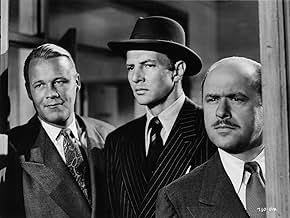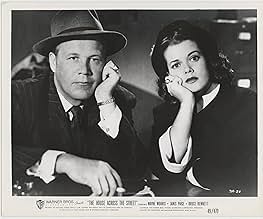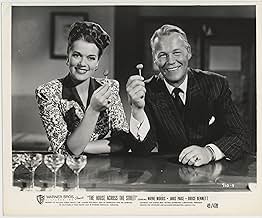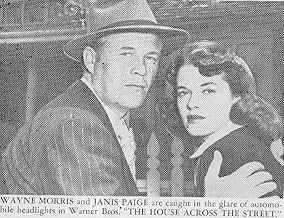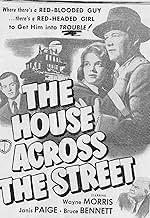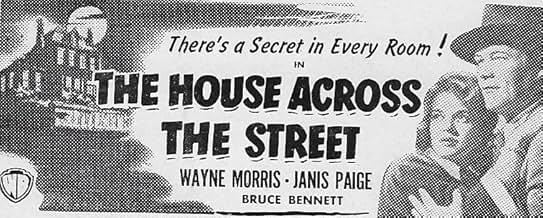CALIFICACIÓN DE IMDb
6.0/10
420
TU CALIFICACIÓN
Agrega una trama en tu idiomaA demoted newspaper man tries to regain his position and his dignity by getting the scoop on a local gangster.A demoted newspaper man tries to regain his position and his dignity by getting the scoop on a local gangster.A demoted newspaper man tries to regain his position and his dignity by getting the scoop on a local gangster.
- Dirección
- Guionistas
- Elenco
Ralph Brooks
- Reporter
- (sin créditos)
Albert Cavens
- Bystander at Hit and Run
- (sin créditos)
Chick Chandler
- Shanlon
- (sin créditos)
George Chandler
- Boss
- (sin créditos)
Phyllis Coates
- Camera GIrl
- (sin créditos)
Sayre Dearing
- Newspaper Office Worker
- (sin créditos)
Harry Denny
- Nightclub Patron
- (sin créditos)
Abe Dinovitch
- Clerk
- (sin créditos)
Harry Evans
- Nightclub Patron
- (sin créditos)
Eddie Foster
- Eddie Macklin
- (sin créditos)
Alex Gerry
- Markley
- (sin créditos)
- Dirección
- Guionistas
- Todo el elenco y el equipo
- Producción, taquilla y más en IMDbPro
Opiniones destacadas
This B-movie was directed by Richard Bare, the guy responsible for all those Joe McDoakes shorts as well as the rural comedies of the 60s, like "Petticoat Junction" and "Green Acres". The story, though very familiar, is quite well done.
The editor of a local newspaper is in hot water with the owner. It seems that Dave Joslin (Wayne Morris) has been running all sorts of critical stories about a mobster named Keever (Bruce Bennett)...and Keever is threatening to sue. But when Joslin refuses to back off, the owner can't fire him...he has a contract with Joslin. So instead to punish him, he's assigned to run the lonely hearts department. Later, when an odd story about a man who was slipped a mickey lands on his desk, Joslin investigates...and thinks this all might be related to Keever. And, instead of going to the police, Joslin decides to investigate for himself.
During the 1930s and 40s, there were tons of mystery films in which some member of the public investigates and solves a crime. However, this one is handled more smoothly--with some very nice acting, writing and direction. Worth seeing despite being a rather slight movie.
The editor of a local newspaper is in hot water with the owner. It seems that Dave Joslin (Wayne Morris) has been running all sorts of critical stories about a mobster named Keever (Bruce Bennett)...and Keever is threatening to sue. But when Joslin refuses to back off, the owner can't fire him...he has a contract with Joslin. So instead to punish him, he's assigned to run the lonely hearts department. Later, when an odd story about a man who was slipped a mickey lands on his desk, Joslin investigates...and thinks this all might be related to Keever. And, instead of going to the police, Joslin decides to investigate for himself.
During the 1930s and 40s, there were tons of mystery films in which some member of the public investigates and solves a crime. However, this one is handled more smoothly--with some very nice acting, writing and direction. Worth seeing despite being a rather slight movie.
I do not know if this would be considered a classic, but it is a nice little film starring Wayne Morris, who by the late 1940's was not seen in too many starring roles in Hollywood. Morris gives a good performance as a newspaper man trying to expose criminal kingpin Bruce Bennett as a murderer. Good pacing, simple script with some fine witty dialogue. I saw this movie during a cold and blustery snowstorm. This is the kind of film that used to grace our late late movies. I sure could use more of this kind of entertainment on tv in the wee hours of morning instead of so many infomercials. Check this one out if it is ever on. It's worth a watch.
MM
MM
A police detective is watching a house across the street. A postman comes upon the house. After awhile, the real postman shows up. The man across the street is a witness against racketeer Matthew Keever and has been murdered by the fake postman. Manager editor Dave Joslin (Wayne Morris) writes several editorials criticizing the police. Keever threatens the paper and Joslin gets demoted to an advice column. Assisted by Kit Williams (Janis Paige), Joslin continues his investigation.
A stuntwoman has a nice stunt. This is the lesser genre of comedy-noir. It's a B-movie. The comedy is lame. I don't think comedy is a natural fit for this genre. That goes for the lead character as well. He's a bit of a Bubba which doesn't fit the role of a hardnosed newspaper man. I'm not laughing. Kit is a good girl Friday and her character has the nice stunt. It's not more than seventy minutes which is part of the B-movie production. It does mean that this movie doesn't spend the money on an action thriller ending and it rushes the wrap-up. It's a B-movie.
A stuntwoman has a nice stunt. This is the lesser genre of comedy-noir. It's a B-movie. The comedy is lame. I don't think comedy is a natural fit for this genre. That goes for the lead character as well. He's a bit of a Bubba which doesn't fit the role of a hardnosed newspaper man. I'm not laughing. Kit is a good girl Friday and her character has the nice stunt. It's not more than seventy minutes which is part of the B-movie production. It does mean that this movie doesn't spend the money on an action thriller ending and it rushes the wrap-up. It's a B-movie.
Managing Editor Wayne Morris is trying to get the goods on gangster Bruce Bennett, but it's all speculation, and Bennett's lawyer is getting nasty about it. Morris won't lay off, and Morris can't be fired, so publisher Alan Hale demotes him to the paper's Miss Lonelyhearts, bumping Janis Paige back to features. Morris doesn't give up, and finds a lead, putting him and Miss Paige into danger.
Morris gives one of those performances that seems all declaratory, but Miss Paige is cute as a button. But her roles were unsatisfactory, so she gave up the movies a couple of years later and became a Broadway star. She's still around as I write this at the age of 101.
Morris gives one of those performances that seems all declaratory, but Miss Paige is cute as a button. But her roles were unsatisfactory, so she gave up the movies a couple of years later and became a Broadway star. She's still around as I write this at the age of 101.
Had this B film remake of Hi Nellie been done during the Thirties before the war my guess is that Warner Brothers probably would have included a lot more action. Other than James Mitchell roughing up Wayne Morris a bit there's no real action in this film, not even the sound of a gun firing. Unusual when you consider the villain is a gangster.]
The House Across The Street had more of an accent on comedy with Wayne Morris being demoted to the advice to the lovelorn column after refusing to back off an expose of gangster Bruce Bennett. It's not that publisher Alan Hale isn't in his corner, but Morris hasn't got any proof and Bennett is doing the ungangster like thing of suing for libel.
But curiously enough a woman who had not had her letter to the column answered, Lila Leeds came up and gives Morris the lowdown on her problem with boyfriend James Holden. She inadvertently provides a clue that starts Morris on the trail of linking Bennett to the murder of a state's witness.
Morris gets plenty of help, good help from the former sob sister at the paper, Janis Paige. She's got good reporter's instincts and was never really given a chance to prove them while Morris was the city editor. Now she's helping, but giving Wayne a few jabs in the process.
The House Across The Street is a nice competently made B film that I'm sure 1949 audiences enjoyed while waiting for the main feature from Warner Brothers to start. It's fast and funny and a real treat.
The House Across The Street had more of an accent on comedy with Wayne Morris being demoted to the advice to the lovelorn column after refusing to back off an expose of gangster Bruce Bennett. It's not that publisher Alan Hale isn't in his corner, but Morris hasn't got any proof and Bennett is doing the ungangster like thing of suing for libel.
But curiously enough a woman who had not had her letter to the column answered, Lila Leeds came up and gives Morris the lowdown on her problem with boyfriend James Holden. She inadvertently provides a clue that starts Morris on the trail of linking Bennett to the murder of a state's witness.
Morris gets plenty of help, good help from the former sob sister at the paper, Janis Paige. She's got good reporter's instincts and was never really given a chance to prove them while Morris was the city editor. Now she's helping, but giving Wayne a few jabs in the process.
The House Across The Street is a nice competently made B film that I'm sure 1949 audiences enjoyed while waiting for the main feature from Warner Brothers to start. It's fast and funny and a real treat.
¿Sabías que…?
- TriviaAs Kit Williams is leaving the bar after talking to Dave, she says to the bartender, "That's thirty for the night". She is alluding to "-30-", traditionally used by newspaper reporters to indicate the end of a submitted story.
- ErroresWhen Marty Bremer sticks his gun into Dave, the tip of the barrel bends down sharply, it obviously being a soft rubber prop (he then strikes Dave's face with it).
- ConexionesRemake of Los mercaderes negros (1942)
- Bandas sonorasThe Gold Diggers' Song (We're in the Money)
(uncredited)
Music by Harry Warren
[Played briefly when the "Financial Editor" sign is shown]
Selecciones populares
Inicia sesión para calificar y agrega a la lista de videos para obtener recomendaciones personalizadas
Detalles
- Fecha de lanzamiento
- País de origen
- Idioma
- También se conoce como
- The House Across the Street
- Locaciones de filmación
- Productora
- Ver más créditos de la compañía en IMDbPro
Taquilla
- Presupuesto
- USD 200,000 (estimado)
- Tiempo de ejecución
- 1h 9min(69 min)
- Color
- Relación de aspecto
- 1.37 : 1
Contribuir a esta página
Sugiere una edición o agrega el contenido que falta

